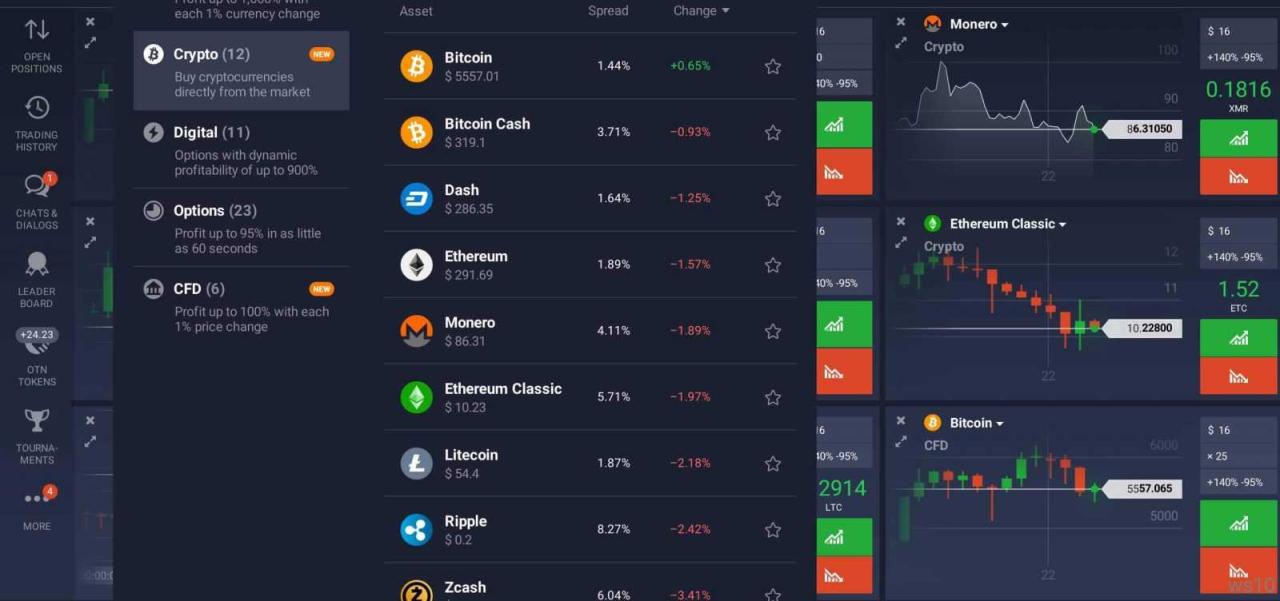
Buying and selling crypto has become increasingly popular in recent years, as more people seek to invest in this emerging asset class. The cryptocurrency market offers a unique opportunity for both experienced traders and newcomers to participate in a decentralized and global financial system. However, navigating the complexities of buying, selling, and storing cryptocurrencies requires a thorough understanding of the fundamentals and best practices. This guide aims to provide a comprehensive overview of the key aspects of buying and selling crypto, empowering individuals to make informed decisions and participate confidently in this dynamic market.
From understanding the basics of cryptocurrency and blockchain technology to exploring various platforms and methods for buying and selling, this guide covers essential topics such as security measures, tax implications, trading strategies, and storage options. We will also delve into the future of cryptocurrencies and their potential impact on traditional financial systems, providing insights into the evolving landscape of this innovative technology.
Understanding Cryptocurrencies
Cryptocurrencies are digital or virtual currencies that use cryptography for security and operate independently of central banks. They are decentralized, meaning they are not controlled by any single entity.
Blockchain Technology
Blockchain technology is the foundation of cryptocurrencies. It is a distributed, immutable ledger that records transactions in a secure and transparent manner. Each block in the blockchain contains a set of transactions, and once a block is added to the chain, it cannot be altered or removed.
Types of Cryptocurrencies
Cryptocurrencies can be categorized into different types based on their features and functionalities.
Bitcoin
Bitcoin (BTC) is the first and most well-known cryptocurrency. It is a decentralized digital currency that allows for peer-to-peer transactions without the need for intermediaries.
Ethereum
Ethereum (ETH) is a decentralized platform that allows for the creation and execution of smart contracts. Smart contracts are self-executing agreements that can automate transactions and processes.
Stablecoins
Stablecoins are cryptocurrencies that are pegged to a stable asset, such as the US dollar. They aim to minimize price volatility and provide a more stable store of value.
Benefits of Investing in Cryptocurrencies
Investing in cryptocurrencies can offer potential benefits, including:
- Decentralization: Cryptocurrencies are not controlled by any single entity, which can provide greater freedom and autonomy.
- Transparency: All transactions are recorded on the blockchain, making them publicly auditable.
- Security: Cryptography is used to secure transactions and protect against fraud.
- Potential for High Returns: Cryptocurrencies have historically experienced significant price fluctuations, offering the potential for high returns.
Risks of Investing in Cryptocurrencies, Buying and selling crypto
Investing in cryptocurrencies also carries significant risks, including:
- Volatility: Cryptocurrency prices can fluctuate significantly, leading to potential losses.
- Security Risks: Cryptocurrencies are susceptible to hacking and theft.
- Regulatory Uncertainty: The regulatory landscape for cryptocurrencies is still evolving, creating uncertainty for investors.
- Lack of Intrinsic Value: Cryptocurrencies do not have any intrinsic value, meaning their value is based on market sentiment and demand.
Buying Cryptocurrencies
Once you’ve grasped the fundamentals of cryptocurrencies, the next step is to acquire them. The world of crypto trading offers various platforms and methods to suit different needs and risk appetites.
Cryptocurrency Exchanges
Cryptocurrency exchanges are online platforms that allow users to buy, sell, and trade digital assets. They act as intermediaries, matching buyers and sellers.
Exchanges typically offer a wide selection of cryptocurrencies, competitive pricing, and advanced trading features. Some popular examples include:
- Coinbase: A user-friendly platform for beginners, known for its intuitive interface and robust security features.
- Binance: A leading exchange globally, offering a vast selection of cryptocurrencies and advanced trading tools.
- Kraken: Known for its professional trading features and focus on security.
Peer-to-Peer Platforms
Peer-to-peer (P2P) platforms facilitate direct transactions between individuals. These platforms connect buyers and sellers who agree on a price and payment method. P2P platforms offer greater flexibility and potentially lower fees compared to exchanges. Some popular examples include:
- LocalBitcoins: A platform for buying and selling Bitcoin using various payment methods, including cash.
- Paxful: A global marketplace for buying and selling cryptocurrencies with various payment options, including gift cards.
Cryptocurrency ATMs
Cryptocurrency ATMs are physical machines that allow users to buy and sell cryptocurrencies using cash. They are convenient for those who prefer a hands-on approach and want to avoid online exchanges.
Cryptocurrency ATMs typically charge higher fees compared to online platforms, and their availability varies depending on location.
Security Measures
When purchasing cryptocurrencies, it is essential to prioritize security to protect your funds.
- Strong Passwords: Use complex passwords with a combination of uppercase and lowercase letters, numbers, and symbols.
- Two-Factor Authentication (2FA): Enable 2FA on your exchange accounts to add an extra layer of security by requiring a code from your phone or email in addition to your password.
- Hardware Wallet: Store your cryptocurrencies offline on a hardware wallet for enhanced security. Hardware wallets are physical devices that store your private keys offline, making them more resistant to hacking.
- Be Wary of Scams: Be cautious of phishing attempts and fraudulent websites that try to steal your login credentials or cryptocurrency.
Selling Cryptocurrencies
Selling cryptocurrencies is the process of exchanging your digital assets for fiat currency (like US dollars) or other cryptocurrencies. It’s the opposite of buying, and it’s often done to realize profits, manage risk, or simply access funds.
Selling Cryptocurrencies on Different Platforms
The process of selling cryptocurrencies varies depending on the platform you choose. Here’s a breakdown of common platforms and their selling mechanisms:
- Cryptocurrency Exchanges: These platforms, like Binance, Coinbase, and Kraken, allow you to sell your crypto for fiat currency or other cryptocurrencies. The process typically involves placing a sell order at a specific price or using the market price to sell immediately. You can then withdraw your funds to your bank account or keep them on the exchange.
- Decentralized Exchanges (DEXs): DEXs, such as Uniswap and PancakeSwap, operate without a central authority. You directly interact with smart contracts to exchange cryptocurrencies. Selling on DEXs often involves connecting your cryptocurrency wallet to the platform and swapping your tokens.
- Peer-to-Peer (P2P) Platforms: Platforms like LocalBitcoins connect buyers and sellers directly. You can negotiate prices and payment methods with other users. These platforms often involve more manual steps and require caution to avoid scams.
Tax Implications of Selling Cryptocurrencies
The tax implications of selling cryptocurrencies vary significantly depending on your jurisdiction. Here’s a general overview:
- Capital Gains Tax: In many countries, profits from selling cryptocurrencies are considered capital gains and are subject to taxation. The tax rate can vary based on your income level and the holding period of the cryptocurrency.
- Income Tax: If you actively trade cryptocurrencies, your profits might be considered taxable income rather than capital gains. The tax rate could be higher than capital gains tax.
- Value Added Tax (VAT): In some countries, VAT may be applicable to cryptocurrency transactions, depending on the specific regulations.
It’s essential to consult with a qualified tax professional in your jurisdiction to understand the specific tax implications of selling cryptocurrencies.
Managing Risk and Maximizing Profits
Selling cryptocurrencies involves inherent risks, and managing these risks is crucial for maximizing profits. Here are some tips:
- Set Realistic Goals: Define your investment objectives and risk tolerance before selling. Avoid impulsive decisions driven by market fluctuations.
- Diversify Your Portfolio: Don’t put all your eggs in one basket. Diversify your cryptocurrency holdings to mitigate risk. Investing in different cryptocurrencies with varying market caps and functionalities can help reduce overall volatility.
- Use Stop-Loss Orders: Stop-loss orders automatically sell your cryptocurrencies when the price reaches a predetermined threshold. This can help limit potential losses during market downturns.
- Consider Tax Implications: Factor in tax implications when making selling decisions. Understanding the tax rules in your jurisdiction can help you optimize your profits after taxes.
- Stay Informed: Stay updated on market trends, regulatory changes, and industry news. This knowledge can help you make informed decisions about selling your cryptocurrencies.
“It’s important to remember that selling cryptocurrencies is a personal decision based on your individual circumstances and investment goals.”
Trading Cryptocurrencies: Buying And Selling Crypto
Cryptocurrency trading involves buying and selling digital assets on exchanges to profit from price fluctuations. This activity can be both exciting and challenging, requiring knowledge, strategy, and risk management.
Trading Strategies
Various strategies are employed by traders to navigate the volatile cryptocurrency market. These strategies can be categorized based on their time horizon and risk appetite:
- Scalping: This strategy aims to profit from small price movements within a short timeframe, typically minutes or even seconds. Scalpers utilize technical analysis to identify short-term trends and execute numerous trades to accumulate small profits.
- Day Trading: Day traders focus on profiting from price fluctuations within a single trading day, closing all positions before the market closes. They rely on technical analysis and news events to identify trading opportunities.
- Swing Trading: Swing traders aim to capture larger price swings over a few days or weeks. They utilize technical and fundamental analysis to identify potential price reversals and hold positions for a longer duration than scalpers or day traders.
- Trend Trading: Trend traders focus on identifying and riding long-term price trends. They use technical analysis to confirm the trend and hold positions for weeks, months, or even years, seeking to profit from the overall market direction.
- Arbitrage: Arbitrage traders exploit price differences between different exchanges or markets. They simultaneously buy and sell the same cryptocurrency on different platforms to capitalize on the price discrepancy.
Trading Platforms
Cryptocurrency trading platforms facilitate the buying, selling, and trading of digital assets. They offer a range of features and functionalities to cater to different trader profiles. Here are some of the most popular platforms:
- Binance: Binance is a leading cryptocurrency exchange known for its vast selection of trading pairs, low fees, and advanced trading tools. It caters to both beginners and experienced traders.
- Coinbase: Coinbase is a user-friendly platform that is popular among beginners. It offers a simplified interface, educational resources, and a limited selection of cryptocurrencies.
- Kraken: Kraken is a well-established exchange with a focus on security and liquidity. It provides advanced trading features, including margin trading and futures contracts, making it suitable for experienced traders.
- KuCoin: KuCoin is a popular exchange known for its diverse range of trading pairs, low fees, and a vibrant community. It offers a variety of trading features, including spot trading, margin trading, and futures contracts.
- Bittrex: Bittrex is a reputable exchange known for its robust security measures and extensive selection of cryptocurrencies. It caters to experienced traders seeking a secure and reliable platform.
Technical Indicators
Technical indicators are mathematical calculations based on historical price data that help traders identify potential trading opportunities and assess market sentiment. Here is a table outlining some common technical indicators used in cryptocurrency trading:
| Indicator | Description | Usage |
|---|---|---|
| Moving Average (MA) | A line that represents the average price over a specific period. | Identify trends, support and resistance levels, and potential buy or sell signals. |
| Relative Strength Index (RSI) | A momentum indicator that measures the magnitude of recent price changes to evaluate overbought or oversold conditions. | Identify potential price reversals and assess market sentiment. |
| Bollinger Bands | A volatility indicator that shows price fluctuations within a specific range. | Identify potential breakouts or breakdowns and assess market volatility. |
| MACD (Moving Average Convergence Divergence) | A trend-following momentum indicator that identifies potential buy or sell signals. | Confirm trends, identify potential price reversals, and assess market momentum. |
| Stochastic Oscillator | A momentum indicator that compares a security’s closing price to its price range over a given period. | Identify overbought or oversold conditions and potential price reversals. |
Storing Cryptocurrencies

Once you’ve acquired cryptocurrencies, it’s crucial to store them securely. This is where wallets come into play, acting as digital containers for your crypto assets. Different types of wallets offer varying levels of security and accessibility, making it essential to understand the options available.
Hardware Wallets
Hardware wallets, also known as cold wallets, are physical devices that store your cryptocurrency offline. They are considered the most secure option for storing cryptocurrencies.
- Security: Hardware wallets are highly secure because they keep your private keys offline, making them inaccessible to hackers. The physical device acts as a barrier against online threats.
- Accessibility: Hardware wallets offer limited accessibility as you need the physical device to access your funds. This makes them less convenient for frequent trading but ideal for long-term storage.
Software Wallets
Software wallets, also known as hot wallets, are digital applications that store your cryptocurrencies on your computer or mobile device.
- Security: Software wallets are generally less secure than hardware wallets because they are connected to the internet. This makes them susceptible to malware and hacking attempts.
- Accessibility: Software wallets are highly accessible, allowing you to easily manage your cryptocurrencies from your computer or mobile device. They are convenient for frequent trading.
Exchanges
Cryptocurrency exchanges are platforms that allow you to buy, sell, and trade cryptocurrencies. While exchanges offer a convenient way to manage your crypto assets, they also pose security risks.
- Security: Exchanges are often targeted by hackers, making them less secure than hardware or software wallets. If an exchange is compromised, your funds may be stolen.
- Accessibility: Exchanges provide easy access to your cryptocurrencies, making them ideal for frequent trading. However, you are essentially entrusting your funds to a third party, which can be risky.
Comparison of Wallet Types
| Wallet Type | Security | Accessibility | Pros | Cons |
|---|---|---|---|---|
| Hardware Wallet | High | Low | Offline storage, resistant to hacking | Less convenient for frequent trading |
| Software Wallet | Medium | High | Easy access, convenient for trading | Vulnerable to malware and hacking |
| Exchange | Low | High | Easy access, convenient for trading | High risk of hacking, potential loss of funds |
The Future of Cryptocurrencies

The world of cryptocurrencies is constantly evolving, and its potential impact on traditional financial systems and other sectors is vast. As blockchain technology matures and adoption grows, we can expect to see significant advancements and innovative applications that will shape the future.
Impact on Traditional Financial Systems
Cryptocurrencies have the potential to disrupt traditional financial systems in several ways.
- Decentralization: Cryptocurrencies operate on decentralized networks, eliminating the need for intermediaries like banks. This can lead to faster and cheaper transactions, increased transparency, and greater financial inclusion.
- Increased Efficiency: Blockchain technology enables faster and more efficient cross-border payments, reducing costs and delays associated with traditional banking systems.
- Competition: The emergence of cryptocurrencies creates competition for traditional financial institutions, potentially leading to innovation and improved services.
While the impact of cryptocurrencies on traditional financial systems is still unfolding, it is clear that they have the potential to transform the way we manage and access our finances.
Future Trends and Advancements
The cryptocurrency space is characterized by rapid innovation and constant evolution. Here are some key trends and advancements to watch:
- Increased Adoption: As more individuals and businesses adopt cryptocurrencies, the ecosystem will grow, leading to greater liquidity and broader acceptance.
- Regulation: Governments around the world are actively developing regulatory frameworks for cryptocurrencies, creating a more stable and secure environment for investors and businesses.
- Scalability: Blockchain technology is constantly evolving to address scalability challenges, enabling faster transaction speeds and handling larger volumes of transactions.
- Interoperability: The development of interoperability solutions will allow different blockchains to communicate and exchange information, creating a more interconnected ecosystem.
Applications of Blockchain Technology Beyond Finance
Blockchain technology has applications beyond finance, with the potential to revolutionize various industries.
- Supply Chain Management: Blockchain can track products from origin to destination, improving transparency, reducing fraud, and enhancing efficiency.
- Healthcare: Blockchain can secure and manage patient data, enabling secure data sharing and improving healthcare outcomes.
- Voting: Blockchain can create secure and transparent voting systems, reducing the risk of fraud and increasing voter confidence.
- Identity Management: Blockchain can provide a secure and verifiable digital identity, reducing the need for physical documents and simplifying identity verification processes.
Closing Summary

The world of cryptocurrency is constantly evolving, presenting both opportunities and challenges. By understanding the fundamentals of buying and selling crypto, individuals can navigate this dynamic market with confidence. Whether you’re a seasoned investor or a curious newcomer, this guide provides the knowledge and tools to make informed decisions and explore the potential of this revolutionary technology. As the cryptocurrency landscape continues to mature, the future holds exciting possibilities for both individuals and businesses alike.
Commonly Asked Questions
What are the risks associated with buying and selling crypto?
Cryptocurrencies are highly volatile and subject to significant price fluctuations. There is also a risk of losing your investment due to scams, hacks, or regulatory changes. It’s crucial to conduct thorough research, understand the risks involved, and only invest what you can afford to lose.
How do I choose a cryptocurrency exchange?
Consider factors such as security, fees, available cryptocurrencies, user interface, and regulatory compliance. Research reputable exchanges and read reviews before making a decision.
What is the best way to store my crypto?
Hardware wallets are generally considered the most secure option for storing crypto, as they are offline and not susceptible to online threats. However, software wallets can be more convenient for frequent trading.




